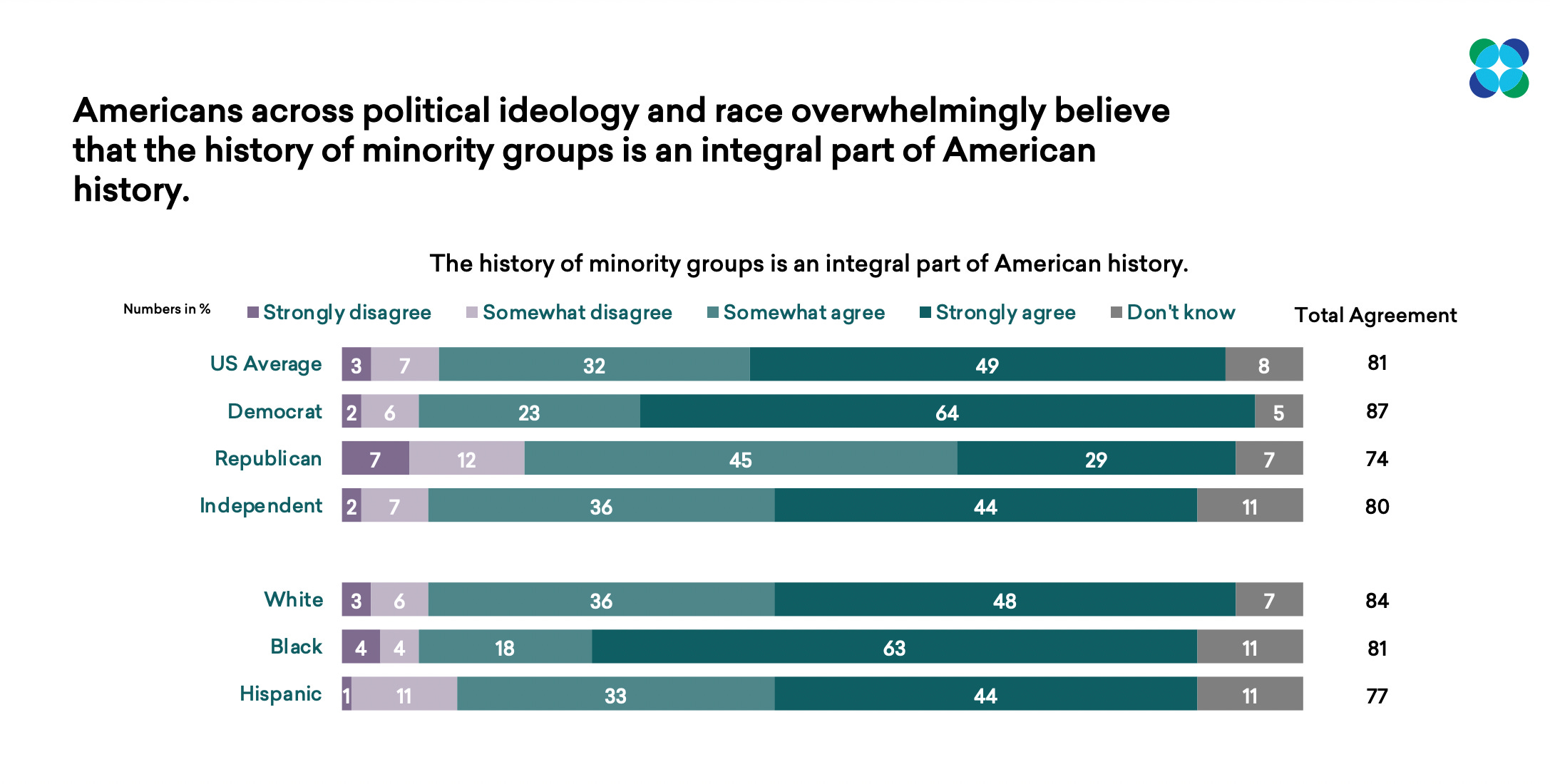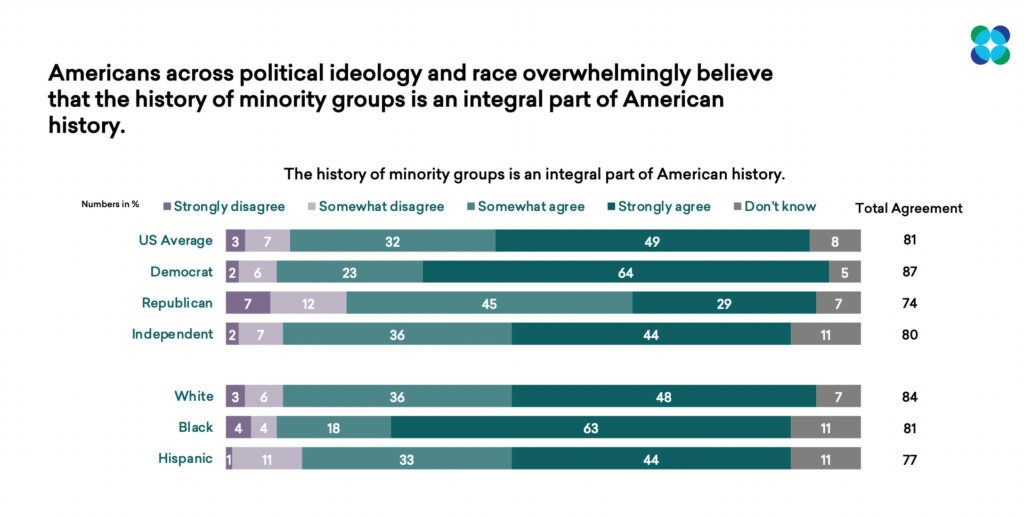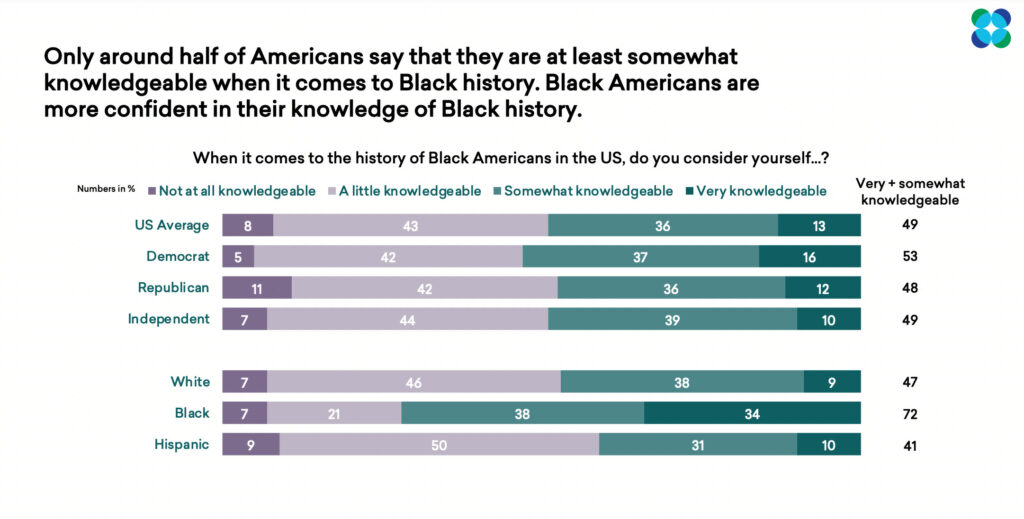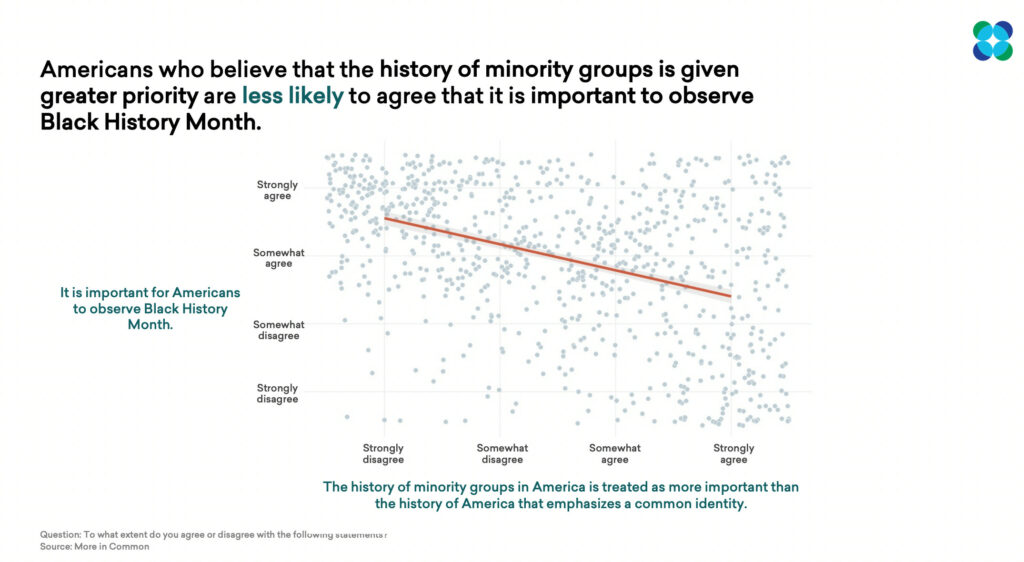February 17, 2023
Defusing the History Wars - A Black History Month Report
More in Common US

Summary: Our latest report explores polarization in the national conversation over American history in the context of Black History Month and provides recommendations on how to broaden Americans’ knowledge of Black history.
According to our most recent report, “Defusing the History Wars: A Black History Month Report,” Americans overwhelmingly believe that Black history, and other minority group history, is integral and inseparable from the history of America. Further, a majority of Americans believe it is important to observe Black History Month. However, only half of Americans feel they are even “somewhat knowledgeable” of Black history. Our research also suggests that finding agreement in how to increase Americans’ knowledge of Black history remains a significant challenge. There are real divergences of opinion, aligned with those identified in our 2022 Defusing the History Wars report, on how much emphasis Americans feel should be placed on observing Black History Month and on whether Black history is currently prioritized over history that elevates a shared national identity.
Our aim is to provide a sharper diagnosis on where Americans diverge in the national conversations over how we share and learn about our country’s history and to highlight common ground. Such insights can empower efforts to bring Americans together to deepen our understanding of the diverse experiences and contributions of Americans that make up the remarkable story of our country.
Our Findings
Most Americans believe that the experiences of minority groups are integral to the story of America (81%). Seven in ten Americans believe it is important to observe Black History Month, although support varies based on one’s politics, race, and age.
“I think Black History Month encourages people to learn, acknowledge, and celebrate Black achievements. To me remembering one’s heritage is important. It shows who we are and what we can accomplish together as fellow Americans from different backgrounds.”
–Emma, age 35-44, Asian woman, Democrat, California
“I don’t think there should be a month based on race or ethnicity. History should be inclusive of all races, ethnicity, gender, etc. I think things like this create more division.”
-Stella, age 25-34, white woman, Republican, Indiana

However, we found that half of Americans across generations and of different political affiliations stated that they did not feel confident in their knowledge of Black history, only 49% say that they are at least somewhat knowledgeable when it comes to Black history. Knowledge varies by race, four in ten white and Hispanic Americans say they feel knowledgeable about Black history, compared to seven in ten Black Americans. Most Americans report that they rely on TV and movies for knowledge on Black history, highlighting the need to increase Americans’ historical knowledge both within and outside of school settings.

And yet teaching this history faces some opposition: half of Americans think “the history of minority groups is treated as more important than the history of Americans in general” (51%), while others feel that not enough is taught about Black history and the accomplishments of Black Americans.
“I do think many important Black people have been overlooked by America and while they do need to be talked about more and taught about in schools, I just don’t think we need a month to celebrate them. I think it creates separatism rather than bringing people together.”
– Mildred, age 45-54, white woman, Independent, Illinois
“Certain things in history were not taught in school and Black History Month helps make others aware of different cultures. Students are still not being taught the accomplishments of many Black Americans, except the well-known ones.”
–Bettie, 65+, Black woman, Democrat, Georgia
This disagreement on the prioritization of minority group history compounded by a distrust in how schools teach history poses a thorny challenge for developing consensus on how to better educate Americans about Black history through our education system. For example, we found Americans who believe that the history of minority groups is being prioritized are less likely to support incorporating Black history into their local school’s curriculum.

“I find accomplishments and contributions of Black Americans, and all races for that matter, to be sources for American pride. It is an opportunity to learn about and understand each other. Unfortunately, like too many things in American society currently, there seems to be a growing political agenda as opposed to celebration.”– Tobias, age 55-64, white man, Independent, New York
These challenges have become even more evident as debates take hold across the country on how to incorporate the history of minority groups in school curricula. By better understanding the different perspectives fueling some of the tensions underlying these debates, we can be better equipped to navigate them.
Recommendations
While significant challenges remain in navigating our areas of division, the broad support for learning the history of different racial groups suggests that there are opportunities to deepen Americans’ knowledge of the country’s shared history while also incorporating the diversity and distinctive nature of Black Americans’ experiences. Recommendations to do that include:
👉Challenging a binary mindset that suggests the history of minority groups comes at the expense of a shared identity.
👉Building coalitions to support Black History Month within but also outside of the settings of schools so that more members of the community feel engaged in the content, events, and themes.
👉Communicating that observing cultural heritage is an act of patriotism and source of pride.
👉Highlighting the efforts of cultural heritage months to elevate stories of strength, success, resilience, and progress, in addition to histories of oppression, injustice and harm.
📊 Click here to read the full report: Defusing The History Wars: A Black History Month Report.
Methodology
For this study about Black History Month, More in Common partnered with international polling company YouGov to conduct online survey interviews with N=1,000 adult US citizens from December 22, 2022, to January 5, 2023.
In February 2022, we spoke to an online community representative of the American general population about their views on Black History Month and other cultural heritage months. Quotes from those conversations are included in this report. Names have been changed to protect their privacy. Grammar and punctuation have been lightly edited for clarity.
Defusing the History Wars
Defusing the History Wars- Black History Month, is a companion piece to our previous report, Defusing the History Wars: Finding Common Ground in Teaching America’s National Story. Access the full report, videos from interviews, and take the History Wars quiz here.